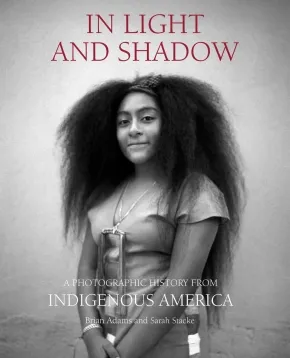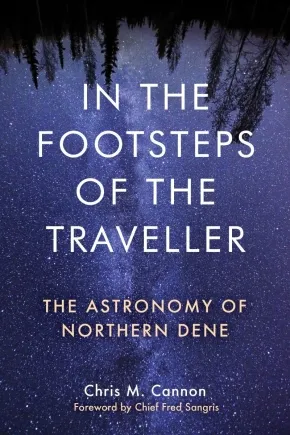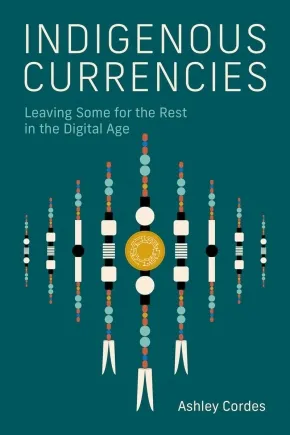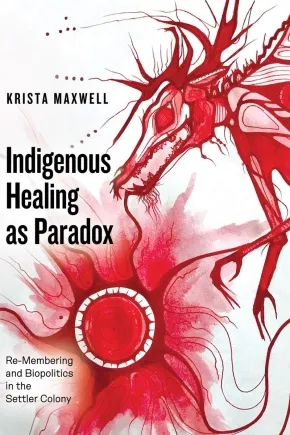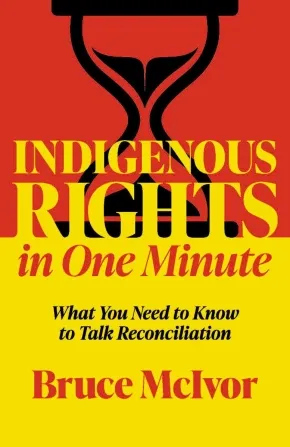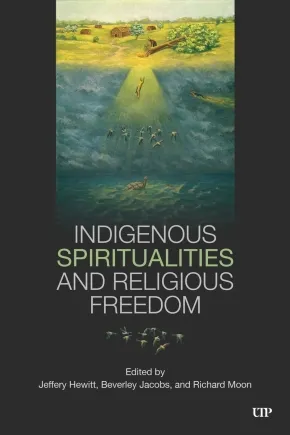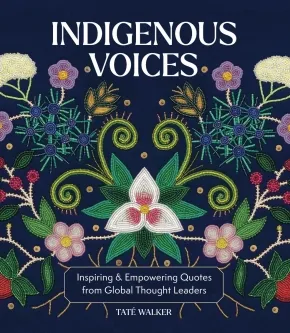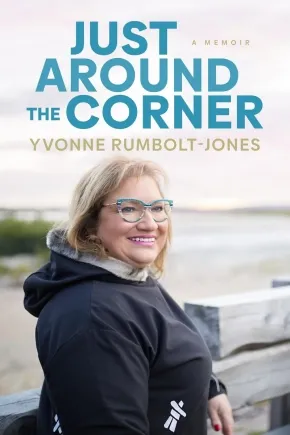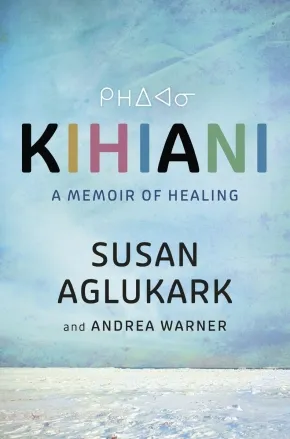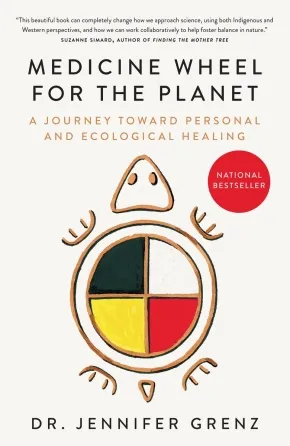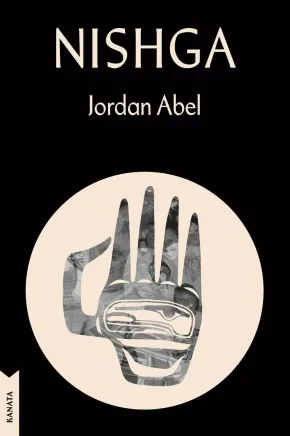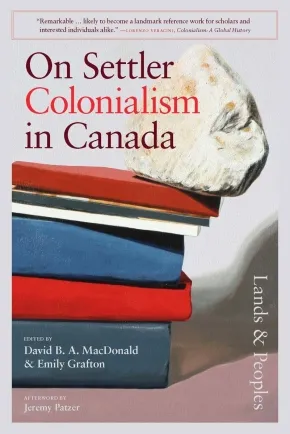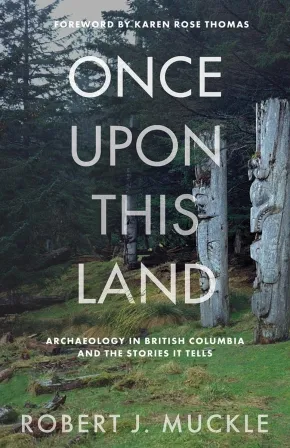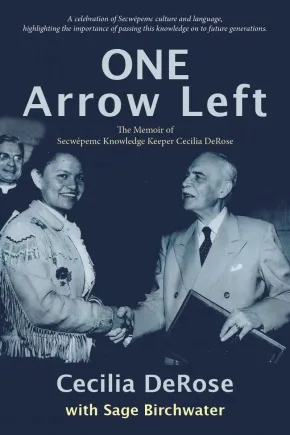
Indigenous Peoples in Canada
31
-
45
of
578 Results;
Sort By
Go To
of 39
In Light and Shadow: A Photographic History from Indigenous America
$51.00
Artists:
Format:
Hardcover
Text Content Territories:
Indigenous Canadian; Indigenous American; Indigenous Polynesian; Indigenous Hawaiian;
Reading Level: N/A
ISBN / Barcode: 9780762482467
Synopsis:
Synopsis:
A landmark photography collection featuring work exclusively by Indigenous Americans, shedding new light on the understanding of Indigenous America.
The history of photography–and the Americas–is incomplete without the critical work and perspectives of Indigenous American photographers. Since the 1800s, cameras have been in the hands of Indigenous people and they have incorporated photography into their lives as creators, patrons, and collectors.
Five years ago, photographers Brian Adams and Sarah Stacke set off on a mission to assemble a groundbreaking, digital library of Indigenous photographers from the 19th century to the present. With In Light and Shadow: A Photographic History from Indigenous America, Adams and Stacke expand on that work, creating a one-of-a-kind collection of photographs that offers a first-hand look at the people, cultures, and evolving traditions of Indigenous America while providing a counterhistory to settler-colonial narratives.
From Jennie Fields Ross Cobb, the earliest known Indigenous American woman photographer, to Arhuaco documentarian Amado Villafaña Chaparro, through Kapuleiikealoonalani Flores, a Native Hawaiian who was born in 2000, the photographers span many generations as well as multiple Indigenous societies and nations. Each entry includes a biographical sketch of the artist, along with their inspirations and contributions to the photographic medium.
With profiles of 80 photographers and more than 250 photographs, this unique book brings to light the canon of Indigenous American photography that has been developing on its own terms for decades.
Additional Information
304 pages | 8.50" x 10.30" | 250 black-and-white and color photographs | Hardcover
In the Footsteps of the Traveller: The Astronomy of Northern Dene
$34.95
Format:
Paperback
Text Content Territories:
Indigenous American; Alaska Native; Indigenous Canadian; First Nations; Dene;
Grade Levels: 12; University/College;
ISBN / Barcode: 9781772840988
Synopsis:
Synopsis:
Teachings from the stars
Much more than stories about the sky, Indigenous astronomies provide powerful, centuries-old models of knowing, being, and relating to the world. Through collaboration with more than sixty-five Dene Elders and culture bearers across thirty-four communities in Alaska and Canada, In the Footsteps of the Traveller reveals the significance of the stars to Northern Dene life, language, and culture.
At the centre of these knowledge systems is the Traveller, a being who journeyed around the world in Ancient Time before incarnating among the stars. The Traveller constellation is a teacher, a gamekeeper, a guardian, and a practical guide for wayfinding. The Traveller, together with a host of other celestial and atmospheric phenomena like thunder and the northern lights, bridges the divide between earth and sky, instilling balance and instructing people on how to live with each other and their environments.
This study combines interviews, stunning photographs and detailed illustrations of the northern night sky, author Chris M. Cannon's own experiential learning, and a foreword from Chief Fred Sangris of Yellowknives Dene First Nation. Rooted in years of collaborative fieldwork, In the Footsteps of the Traveller leads the way to deeper understandings of Northern Dene astronomical knowledge.
Reviews
"In the Footsteps of the Traveller is a ground-breaking book. Cannon's authoritative treatise of Dene knowledge of the stars is unique and exemplary, redefining the field by linking the basic ethos of Dene life to a meticulously documented body of shared but threatened knowledge. Detailed and precise, the book innovates by showing how knowledge-of how to live with other people, with animals, with nature-is encoded in astronomical and aerial phenomena."— Guy Lanoue
"Chris Cannon's contribution to the subject of Dene astronomy stands alone. Many authors have referred to Dene knowledge of the stars but no one has gone into such detail or pulled the topic together in such a comprehensive manner."— William Simeone
"Impressive and thorough in both its astronomical and linguistic dimensions, Cannon's solid scholarship illuminates Northern Dene cosmology while promoting a greater appreciation of Dene history, traditions, and knowledge systems. Germinal studies of this breadth are only made possible through lengthy and respectful cooperation between the researcher and Indigenous knowledge holders. The author's engaging story of his travels and collaborations with his Dene teachers-an immersive process lasting some fourteen years-convincingly demonstrates this point, infusing the narrative with a vital personal component."— John MacDonald
Educator Information
Table of Contents
List of Illustrations
Foreword by Chief Fred Sangris
Acknowledgements
Introduction
The Northern Dene
A Note on Dene Orthographies
1. The Traveller Constellation Part I
The Gwich’in Constellation Yahdii
The Ahtna Constellation Nek'eltaeni
The Lower Tanana Constellation Nogheyoli
The Sahtúot’ı̨nę Constellation Yíhda or Yámǫréya
2. The Traveller Constellation Part II
The Tanacross Constellation Neek'e'elteen
The Upper Tanana Constellation Yihda or Nek'e'eltiin
The Yellowknives Dene Constellation Yèhdaa or Yı̀da
The Koyukon Constellation Ghededzuyhdle or Naagheltaale
The Upper Kuskokwim Constellation Noghiltale
The Dëne Sułiné Constellation Yéhda or Yeda
The Dena’ina Constellation Yuq'eltaeni or Naq'eltaeni
Supporting Evidence from the Literature
3. Stellar Time-Reckoning, Weather Forecasting, and Wayfinding
Divisions of Time
Stellar Time-Reckoning
Introduction to Northern Dene Stellar Wayfinding
Yellowknives Dene Stellar Wayfinding
Gwich'in Stellar Wayfinding
Stellar Wayfinding Discussion
Stars and Planets in Weather Forecasting
4. The Sun, Moon, and Eclipses
The Sun
The Moon
Eclipses
5. Beings of the Atmosphere Part I
Northern Lights
Meteors
Halo Phenomena
6. Beings of the Atmosphere Part II
Rainbows
Thunderbirds
Deterring Unfavourable Weather
Colours of the Sky
7. Knowing, Being, and Relating
Appendix A: Northern Dene Names for the Traveller
Appendix B: The Cosmic Hunt in Northern Dene Cultures
Notes
Bibliography
Index
Additional Information
448 pages | 6.00" x 9.00" | 57 colour illustrations, 4 maps, index, bibliography | Paperback
Indigenous Currencies: Leaving Some for the Rest in the Digital Age
$48.00
Format:
Paperback
Text Content Territories:
Indigenous American; Indigenous Canadian;
Reading Level: N/A
ISBN / Barcode: 9780262552530
Synopsis:
Synopsis:
How Indigenous currencies—including wampum and dentalium shells, beads, and the cryptocurrency MazaCoin—have long constituted a form of resistance to settler colonialism.
Indigenous Currencies follows dynamic stories of currency as a meaning-making communication technology. Settler economies regard currency as their own invention, casting Indigenous systems of value, exchange, and data stewardship as incompatible with contemporary markets. In this book, Ashley Cordes refutes such claims and describes a long history of Indigenous innovation in currencies, including wampum, dentalium, beads, and, more recently, the cryptocurrency MazaCoin. By looking closely at how currencies developed over time through intercultural communication, Cordes argues that Indigenous currencies transcend the scope of economic value, revealing the cultural, social, and political context of what it means to exchange.
The book’s two main case studies, the gold rush and the code rush, frame a deep dive into how Indigenous ways of being have shaped the use and significance of currency and vice versa. Settler currencies, which have developed in the wake of wars and through massively scaled forms of material extraction, offer a very different story of the place of currencies within settler economies of dispossession. The second part of the study asks how contemporary cryptocurrencies may play a critical role in cultivating Tribal sovereignty. The author analyzes structural properties of the polymorphic blockchain to provide key insights into how emergent digital spaces, with their attendant forms of meaning and value represented by code, NFTs, and Web 3.0, are inextricably connected to Indigenous knowledges. The book cultivates a vision of currency in which the principle of leaving some for the rest establishes a way of imagining relationships of exchange beyond their enclosure within settler-capitalist parameters of extraction and into currents of deep reciprocity.
Reviews
"Brilliantly written in the best of Coquille Nation practices, wisdom of ancestors, and traditional technologies, Indigenous Currencies is a gift guiding us through deep insights for the digital realm."—Tiara R. Na’puti, University of California, Irvine
"Indigenous Currencies is an unparalleled study of cryptocurrency's colonialism and Indigenous decolonial possibilities in this powerful space. Cordes takes Indigenous epistemologies to places previously unexamined, and she does so by grounding case studies in practices of Indigenous digital agency."—Jason Edward Black, University of North Carolina at Charlotte; author of Mascot Nation
Educator Information
226 pages | 6.06" x 9.00" | 22 b&w illustrations | Paperback
Indigenous Healing as Paradox: Re-Membering and Biopolitics in the Settler Colony
$29.99
Format:
Paperback
Text Content Territories:
Indigenous Canadian;
Reading Level: N/A
ISBN / Barcode: 9781772125740
Synopsis:
Synopsis:
Indigenous healing is a paradox in the liberal settler colony where efforts to foster well-being can simultaneously undermine distinct Indigenous societies. This book examines the prominence of “Indigenous healing” in Canadian public discourse through a historical and ethnographic lens. It focuses on late twentieth-century Indigenous social histories in Treaty 3 territory and cities in northern and southern Ontario to show practices of re-membering—drawing on traditional ways of being and knowing for social repair and collective rejuvenation—against the backdrop of the social dismemberment of Indigenous Peoples. Expansion of re-membering is often enabled by tactical engagements with the settler state which have fuelled an Indigenized biopolitics from below. Maxwell offers an analysis of the possibilities, tensions, and risks inherent to these biopolitical tactics. Informed by Indigenous feminist scholarship that emphasizes relationality, care, and the everyday, as well as the intimate workings of settler colonialism, this book aims to enrich critical conversations about reconciliation and resurgence politics and challenge their perceived dichotomy.
Reviews
"Indigenous Healing as Paradox is a sophisticated study that explains how Indigenous encounters with settler colonial healthcare systems that could potentially improve their lives also threaten to destroy their collective wellbeing. Beautifully written and tightly focused, it follows Indigenous biopolitical actors navigating this paradox through tactical engagements with the settler state."- Maureen Lux, author of Separate Beds: A History of Indian Hospitals in Canada
"Indigenous Healing as Paradox is an important contribution to the historiography of Indigenous health and social wellbeing. Maxwell offers a critical lens on the perils of adopting reconciliation and healing discourses that focus on historic injustices and the individual in need of treatment at the expense of ongoing systemic issues." - Kim Anderson, University of Guelph
"Maxwell is attentive to the complexities of Indigenous people's responses to the insidious violence of settler colonial intrusion and governance. Indigenous Healing as Paradox is an important book that takes an original stance." - Alexandra Widmer, York University
Educator Information
Table of Contents
- Preface
- Acknowledgements
- Artist Statement
- Introduction: Indigenous Re-Membering and Biopolitics in the Liberal Settler Colony
- Chapter One: Giizhiiganang and Anishinaabe Re-Membering, 1965–1980
- Chapter Two: Re-Membering and Biopolitics in Urban Ontario, 1973–1980s
- Chapter Three: “Family Violence Is Weakening Our Nations”: Indigenous Women, Political Dismemberment, and Family Healing, 1972–1990
- Chapter Four: Biopolitical Tactics under Neoliberal Settler Colonialism: Healing as Public Discourse, 1990–2015
- Conclusion: Towards an Indigenized Politics of Life
- Appendix: Methods and Sources
- Notes
- References
- Index
Additional Information
208 pages | 6.00" x 9.00" | Paperback
Indigenous Knowledges and Higher Education in Canada
$32.95
Format:
Paperback
Text Content Territories:
Indigenous Canadian;
Reading Level: N/A
ISBN / Barcode: 9781487542900
Synopsis:
Synopsis:
Indigenous Knowledges and Higher Education in Canada explores the intricate relationship between Indigenous knowledges and the evolving landscape of higher education in Canada, revealing their profound influence in shaping institutional policies, practices, and cultures. Grounded in decolonial perspectives, the book addresses the persistent struggle within universities to confront ongoing colonialism and achieve systemic change.
Focused on shifts in institutional governance, policy, teaching, research, innovation, and culture, the book draws on extensive document analysis and personal narratives of Indigenous individuals across various Canadian universities. Embracing a decolonial perspective, it underscores the resilience of Indigenous communities in challenging traditional paradigms of higher education. The book reveals how, through critical grassroots efforts, Indigenous peoples are reclaiming their rightful place in academia, reshaping institutional dynamics from the ground up. It argues that the emergence of Indigenous knowledges within academia is the result of proactive and ongoing efforts by Indigenous individuals asserting their presence in Canadian higher education.
Ultimately, Indigenous Knowledges and Higher Education in Canada advocates for a path of decolonization through intentional learning and unlearning, envisioning a future where Indigenous voices and perspectives are authentically centred in the fabric of academic discourse and practice.
Educator Information
Table of Contents
Figures and Tables
Acknowledgments
Prologue
Part I: Empowering Quotes
Part II:
Colonialism and the University
Indigenous Knowledges and the University
Theorizing Institutional Change from a Decolonial Perspective
Governance and Policy
Institutional Climate
Teaching and Learning Approaches
Research
Innovation
Conclusion: Indigenous Knowledges as Catalyst for Decolonial Change in Canadian Higher Education
References
Index
Additional Information
272 pages | 6.00" x 9.00" | Paperback
Indigenous Rights in One Minute: What You Need to Know to Talk Reconciliation
$22.95
Format:
Paperback
Text Content Territories:
Indigenous Canadian;
Reading Level: N/A
ISBN / Barcode: 9780889714885
Synopsis:
Synopsis:
Internationally renowned as an expert in Aboriginal law and an advocate for Indigenous rights, Bruce McIvor delivers concise, essential information for Canadians committed to truth and reconciliation.
A shortage of trustworthy information continues to frustrate Canadians with best intentions to fulfill Canada’s commitment to reconciliation with Indigenous Peoples. To meet this demand, lawyer and historian Bruce McIvor provides concise, plain answers to 100 essential questions being asked by Canadians across the country.
During his nearly three decades advocating for Indigenous rights and teaching Aboriginal law, McIvor has recorded the fundamental questions that Canadians from all corners of society have asked to advance reconciliation: Why do Indigenous people have special rights? What is the Doctrine of Discovery? Who are the Métis? Why was the Calder decision important? What is reconciliation? McIvor supplies the answers Canadians are looking for by scrapping the technical language that confuses the issues, and speaks directly to everyone looking for straight answers. Throughout, McIvor shares his perspective on why reconciliation as envisioned by the courts and Canadian governments frustrates Indigenous people and what needs to change to overcome the impasse. McIvor’s explanations of complex legal issues demonstrate a unique mix of a deep knowledge of the law, the ability to write clearly and concisely, practical experience from the frontlines of advocating for First Nations in courtrooms and at negotiation tables across the country, and a profound passion for justice rooted in his work and personal history.
To ensure the country’s reconciliation project progresses from rhetoric to reality, ordinary Canadians need straightforward answers to fundamental questions. McIvor provides the answers and context to support a thoughtful and respectful national conversation about reconciliation and the fulfillment of Canada’s commitment to a better future for Indigenous people.
Additional Information
208 pages | 5.50" x 8.50" | 25 colour and b&w photographs | Paperback
Indigenous Spirituality and Religious Freedom
$34.95
Format:
Paperback
Text Content Territories:
Indigenous Canadian;
ISBN / Barcode: 9781487523794
Synopsis:
Synopsis:
Indigenous Spiritualities and Religious Freedom investigates the complex relationship between Indigenous legal orders and Canadian law, emphasizing the richness of Indigenous spiritual practices alongside their historical and ongoing suppression by the Canadian state. It critically examines the role and limitations of the Canadian Charter of Right’s section 2(a), which guarantees freedom of religion, in protecting the spiritual lives of Indigenous communities.
The book highlights the holistic nature of Indigenous spiritual beliefs, which view the spiritual as immanent and closely tied to land and specific locations. The book reveals how, by contrast, the Anglo-American conception of religious freedom often separates spiritual and religious matters from civic and political concerns, and so fails to provide meaningful protection for Indigenous cultural and spiritual practices.
Many essays in this collection propose alternative approaches to the relationship between Canadian law and Indigenous legal orders, particularly regarding Indigenous spiritual practices. Ultimately, Indigenous Spiritualities and Religious Freedom reveals the challenges – and perhaps the futility – of seeking significant protection for Indigenous spiritual practices within the existing framework of religious freedom.
Educator Information
Chapters
Introduction
Jeffery Hewitt, Beverly Jacobs, and Richard Moon
1. Water Is Life: Haudenosaunee Responses to Climate Change and Water Security - Dawn Martin-Hill
2. The Gaya’shra’gowa’ in the Twenty-First Century: Traditional Indigenous Governance and the Problem of Canadian Settler Colonial Law - Theresa McCarthy
3. An Imaginary for Our Sisters: Spirits and Indigenous Law - Val Napoleon
4. Indigenous Religious Rights: Reconciling Religious Views and Decolonizing Section 2(a) of the Charter - Natasha Bakht
5. Is State Neutrality Bad for Indigenous Religious Freedom? - Benjamin L. Berger
6. Ktunaxa and the Shape of Religious Freedom - Richard Moon
7. Beyond Experience? Objectivity, Indigeneity, and Freedom of Religion - John Borrows
8. Ancestors in the Land: Indigenous Burial Sites and Religious Freedom - Senwung Luk and Howard Kislowicz
9. Posing the Land Question: An Analysis of Servatius v. Alberni School District No. 70 - Ardith Walkem
10. The Perils of Rights and Reconciliation for Indigenous Peoples - Karen Drake
Contributors
Additional Information
240 pages | 6.00" x 9.00" | Paperback
Indigenous Voices: Inspiring & Empowering Quotes from Global Thought Leaders
$25.99
Format:
Hardcover
Text Content Territories:
Indigenous Canadian; Indigenous American; Indigenous South American;
Reading Level: N/A
ISBN / Barcode: 9781577154914
Synopsis:
Synopsis:
Immerse yourself in Indigenous Voices, an inspiring volume of quotations by Indigenous thought leaders, activists, politicians, and scholars illustrated with stunning artwork by Indigenous artists.
This captivating book weaves together the timeless wisdom of Indigenous people from various nations and regions through a mosaic of more than 60 quotes, words, and stories by elders, leaders, activists, scholars, and influential contemporaries spanning all walks of life. Discover the diverse and unique heritage of extraordinary people like:
- Shina Novalinga – A member of the Inuk living in Montreal, Canada, Shina Novalinga is a content creator, singer, and activist who shares her Inuk culture across social media, of which an important aspect is traditional throat singing with her mother.
- Natali Segovia – A member of the Quechua, Natali Segovia is the Executive Director of the Water Protector Legal Collective and a human rights attorney. Her advocacy focuses on defending Water Protectors and human rights defenders facing repression for their activism.
- Corrina Gould – Of the Ohlone, Corrina Gould is the chair and spokesperson for the Confederated Villages of Lisjan, the Co-Director for the Sogorea Te' Land Trust, and the lead organizer for Indian People Organizing for Change.
- Elias Not Afraid – A member of the Apsáalooke (Crow), Elias Not Afraid is a mega-award-winning queer beader and fashion designer. He says, “When people think of native beadwork, they think trinkets and good luck charms and dream catchers but it’s far from it. I create wearable art that is durable and can be used daily and last over a lifetime and be used as a family heirloom.”
- Lily Gladstone – An American actress from the Blackfeet Reservation, Gladstone is of Piegan Blackfeet, Nez Perce, and European heritage. They earned critical acclaim for portraying Mollie Kyle, an Osage woman who survived the Osage Indian murders in Martin Scorsese’s film Killers of the Flower Moon, among other important roles in film and television.
- Kola Shippentower – A member of the Umatilla, Shippentower is the first Native American player for the Oregon Ravens, a tackle football team for women and non-binary players.
- Shiloh Maples – Of the Odawa, Maples is a citizen of the Little River Band of Indians based in Michigan. Through her interest in Indigenous food systems and her own Ojibwe and Odawa heritage, she developed the program Sacred Roots for the American Indian Health and Family Services in Detroit, where she taught cooking classes and promoted dishes using traditional, seasonal, and local ingredients in a way that improved participants’ health while connecting them with their culture.
- Alvera Sargent – Sargent, of the Akwesasne Mohawk, worked with the Akwesasne Freedom School, one of the oldest Indigenous language schools in North America. “My hope for our tribal community at large is that more of our people come back to our traditional space. I am grateful that our time has come as Indigenous people are being recognized for their traditional knowledge systems. The community is recognizing that Indigenous people do have the wisdom of our ancestors to share, which helps all areas of our society.”
- And more!
Indigenous Voices offers a unique opportunity to connect with ancient traditions, refresh your perspective with modern insight, and gain awareness and understanding that resonate across cultures and generations.
Additional Information
192 pages | 7.5" x 8.6" | Hardcover
Just Around the Corner
$26.95
Format:
Paperback
Text Content Territories:
Indigenous Canadian; Inuit;
Reading Level: N/A
ISBN / Barcode: 9781778530357
Synopsis:
Synopsis:
Just Around the Corner is the story of Member of Parliament for Labrador, Yvonne Rumbolt-Jones, a woman from a northern community who broke free of her geographic and political isolation to embrace opportunity.
Just Around the Corner is the story of Member of Parliament for Labrador Yvonne Rumbolt-Jones, a woman from a northern community who broke free of geographic and political isolation to embrace opportunity. An intimate memoir from the longest-serving female politician in Newfoundland and Labrador, Just Around the Corner uncovers Rumbolt-Jones's strength as a survivor as well as her determination and courage through both her private life and her political life. She reveals her early years of dealing with child sexual abuse and experiences with family alcoholism, and her challenges as an adult confronting personal grief and loss, the sexism, public scrutiny, and challenges of party politics, as well as being diagnosed with cancer-twice. Through it all, the thread of Rumbolt-Jones's love for Labrador and its people, and her hope and joy in working for the future of both shines through. She writes with confidence and candour about overcoming adversity and marginality to be elected to both the provincial House of Assembly and the national Parliament, where she has been a strong leader and voice for women, Indigenous peoples, and Canada's North. Her story is that of a woman who refused to let the scars of the past define her, but rather used them to help her grow and understand that while we may not control what harms us, we can control how we move forward.
Additional Information
304 pages | 5.50" x 8.25" | Paperback
Kihiani: A Memoir of Healing
$36.99
Format:
Hardcover
ISBN / Barcode: 9781443472944
Synopsis:
Synopsis:
Profoundly honest and moving, Kihiani is the uplifting story of an Inuk artist’s journey to healing and self-discovery
Born in Fort Churchill, Manitoba, but raised in Arviat, a predominantly Inuit community on the western edges of Hudson Bay, Susan and her six siblings grew up in a humble but loving home. But while living in Rankin Inlet, when she was eight years old, Susan’s life was disrupted by a life-changing event, a distinct separation that created a schism inside her for many years and from which she continues to heal.
At fifteen, she started writing poems that spilled out of her, and when Susan had the choice to leave her community, she grabbed it like a lifeline. Eventually, Susan was approached by a producer at CBC who was making a compilation album of Arctic artists and years later signed with a major label for her third album, This Child.
The disruption and milestones, the turmoil and joy, the devastation and healing—this is Susan Aglukark’s story of discovering her Inuk self.
Additional Information
272 pages | 6.00" x 9.00" | Hardcover
Medicine Wheel for the Planet: A Journey toward Personal and Ecological Healing (PB)
$23.00
Format:
Paperback
Text Content Territories:
Indigenous Canadian; First Nations; Salish; Interior Salish; Nlaka'pamux (Thompson);
Reading Level: N/A
ISBN / Barcode: 9781039006034
Synopsis:
Synopsis:
"This beautiful book can completely change how we approach science, using both Indigenous and Western perspectives, and how we can work collaboratively to help foster balance in nature." —Suzanne Simard, bestselling author of Finding the Mother Tree
For readers of Braiding Sweetgrass: Future-saving insights and approaches to science and ecology using both Indigenous and Western perspectives.
A farm kid at heart, and a Nlaka'pamux woman of mixed ancestry, Dr. Jennifer Grenz always felt a deep connection to the land. However, after nearly two decades of working as a restoration ecologist in the Pacific Northwest, she became frustrated that despite the best efforts of her colleagues and numerous volunteers, they weren't making the meaningful change needed for plant, animal and human communities to adapt to a warming climate. Restoration ecology is grounded in an idea that we must return the natural world to an untouched, pristine state, placing humans in a godlike role—a notion at odds with Indigenous histories of purposeful, reciprocal interaction with the environment. This disconnect sent Dr. Grenz on a personal journey of joining her head (Western science) and her heart (Indigenous worldview) to find a truer path toward ecological healing.
In Medicine Wheel for the Planet, building on sacred stories, field observations and her own journey, Dr. Grenz invites readers to share in the teachings of the four directions of the medicine wheel: the North, which draws upon the knowledge and wisdom of elders; the East, where we let go of colonial narratives and see with fresh eyes; the South, where we apply new-old worldviews to envision a way forward; and the West, where a relational approach to land reconciliation is realized.
Eloquent, inspiring and disruptive, Medicine Wheel for the Planet circles toward an argument that we need more than a singular worldview to protect the planet and make the significant changes we are running out of time for.
Reviews
"Grenz shares her ancestral Nlaka'pamux wisdom that respect, relationship and reciprocity with all life is essential in healing the land. In telling her stories, she demonstrates how these fundamental principles underlie the good work. She also teaches us that our ability to understand nature and our success at stewardship requires that we lead with our hearts and keep our beginner’s curiosity open. When we do this, we have unlimited capacity to heal. This beautiful book can completely change how we approach science, using both Indigenous and Western perspectives, and how we can work collaboratively to help foster balance in nature.” —Suzanne Simard, author of Finding the Mother Tree: Discovering the Wisdom of the Forest
“Rooted in both Indigenous and Western ways of understanding and doing science, Medicine Wheel for the Planet challenges the simplistic, dichotomous thinking that has led well-meaning environmentalists astray for too long. In a book that is part primer in ecology, part memoir, and part manifesto, Jennifer Grenz movingly shares her own process of learning and unlearning, of connecting with traditional knowledge and practices to help unearth future-saving insights and approaches — and by doing so, generously invites the reader to undertake a similar transformation. Wise, humble, provocative, brave, and beautifully written, this book is a triumph. Read it and let it alter and expand how you see the world and your place and role within it." —Astra Taylor, author of The Age of Insecurity: Coming Together as Things Fall Apart
“Deeply moving and compelling, Medicine Wheel for the Planet weaves a powerful story about the limitations of restoration ecology and a Western lens, and illuminates a path forward using the power of Indigenous and reciprocal ways of being. An imperative read for all Canadians.” —Angela Sterritt, author of Unbroken: My Fight for Survival, Hope, and Justice for Indigenous Women and Girls
“In this thoughtful and heartfelt book, Dr. Grenz challenges us to reflect on how – despite the massive contributions of Western science – we humans are impacting the Earth and all life on our planet in problematic ways, most recently evident in the ongoing global climate crisis. Guiding us through the medicine wheel concept, she illuminates the deep experiences of the First Peoples, often conveyed through stories, that can inspire us to be better relatives, reminding us to focus our time and energy on healing the Earth. This is a revelatory, immersive work that illustrates, with respect and gratitude, the meaningful role that all systems of knowledge play in connecting ‘our heads and our hearts’ for a healthier planet.” —Nancy J. Turner, Distinguished Emeritus Professor in Environmental Studies, University of Victoria, author/editor of many books including The Earth’s Blanket, Member of the Order of Canada, the Order of British Columbia and winner of Canadian Botanical Association Lawson Medal
“Medicine Wheel for the Planet transported me gently into the dynamic world of plants and trees and offers a powerful viewing lens—one derived from Indigenous storytelling as well as from Western science. Dr. Grenz helped me to see research methods through a more holistic perspective, and skilfully shows what science could accomplish if untangled from the rigid rules of our dominant culture. With patience and humility, she convinced me that if we take the time to look and listen differently, the land will offer us crucial lessons in healing that would otherwise be left unseen and unheard.” —Dr. Jane Philpott, author of Health for All: A Doctor's Prescription for a Healthier Canada
Educator Information
This book is available in French: La roue de médecine: Un nouveau récit pour guérir la planète
Additional Information
280 pages | 5.18" x 8.00" | Paperback
Nishga: Kanata Classics Edition
$22.00
Format:
Paperback
Text Content Territories:
Indigenous Canadian; First Nations; Nisga'a;
Reading Level: N/A
ISBN / Barcode: 9780771023491
Synopsis:
Synopsis:
Part of the inaugural Kanata Classics list, with a new introduction by David Chariandy, NISHGA is a groundbreaking, deeply personal, and devastating autobiographical meditation that attempts to address the complicated legacies of Canada’s residential school system and contemporary Indigenous existence.
As a Nisga'a writer, Jordan Abel often finds himself in a position where he is asked to explain his relationship to Nisga'a language, Nisga'a community, and Nisga'a cultural knowledge. However, as an intergenerational survivor of residential school--both of his grandparents attended the same residential school--his relationship to his own Indigenous identity is complicated to say the least.
NISHGA explores those complications and is invested in understanding how the colonial violence originating at the Coqualeetza Indian Residential School impacted his grandparents' generation, then his father's generation, and ultimately his own. The project is rooted in a desire to illuminate the realities of intergenerational survivors of residential school, but sheds light on Indigenous experiences that may not seem to be immediately (or inherently) Indigenous.
Drawing on autobiography and a series of interconnected documents (including pieces of memoir, transcriptions of talks, and photography), NISHGA is a book about confronting difficult truths and it is about how both Indigenous and non-Indigenous peoples engage with a history of colonial violence that is quite often rendered invisible.
Reviews
“With NISHGA, Jordan Abel has reinvented the memoir, incorporating personal anecdotes, archival footage, legal documentation, photos and concrete poetry to create an unforgettable portrait of an Indigenous artist trying to find his place in a world that insists Indigeneity can only ever be the things that he is not. Abel deftly shows us the devastating impact this gate-keeping has had on those who, through no decisions of their own, have been ripped from our communities and forced to claw their way back home, or to a semblance of home, often unassisted. This is a brave, vulnerable, brilliant work that will change the face of nonfiction, as well as the conversations around what constitutes Indigenous identity. It's a work I will return to again and again.” —Alicia Elliott, author of A Mind Spread Out on the Ground
“In NISHGA, Jordan Abel puts to use the documentary impulse that has already established him as an artist of inimitable methodological flair. By way of a mixture of testimonial vignettes, recordings of academic talks, found text/art, and visual art/concrete poetry, Abel sculpts a narrative of dislocation and self-examination that pressurizes received notions of “Canada” and “history” and “art” and “literature” and “belonging” and “forgiveness.” Yes, it is a book of that magnitude, of that enormity and power. By its Afterword, NISHGA adds up to a work of personal and national reckoning that is by turns heartbreaking and scathing.” —Billy-Ray Belcourt, author of NDN Coping Mechanisms and A History of My Brief Body
"This is a heart-shattering read, and will also be a blanket for others looking for home. NISHGA is a work of absolute courage and vulnerability. I am in complete awe of the sorrow here and the bravery. Mahsi cho, Jordan.” —Richard Van Camp, author of Moccasin Square Gardens
“Jordan Abel digs deeply into the questions we should all be asking. Questions that need no explanation but ones that require us to crawl back into our bones, back into the marrow of our understanding. NISHGA is a ceremony where we need to be silent. Where we need to listen.” —Gregory Scofield, author of Witness, I Am
Educator & Series Information
This edition of Nishga is part of the Kanata Classics series, which celebrates timeless books that reflect the rich and diverse range of voices in Canadian literature.
Additional Information
304 pages | 5.54" x 8.26" | Paperback
On Settler Colonialism in Canada: Lands and Peoples
$36.95
Editors:
Format:
Paperback
Text Content Territories:
Indigenous Canadian;
Reading Level: N/A
ISBN / Barcode: 9781779400642
Synopsis:
Synopsis:
An unflinching examination of the impacts of settler colonialism from first contact to the contemporary nation state.
On Settler Colonialism in Canada: Lands and Peoples is the first installment in a comprehensive collection investigating settler colonialism as a state mandate, a structuring logic of institutions, and an alibi for violence and death. The book examines how settler identities are fashioned in opposition to nature and how eras of settler colonialism have come to be defined. Scholars and thinkers explore how settlers understood themselves as servants of empire, how settler identities came to be predicated on racialization and white supremacy, and more recently, how they have been constructed in relation to multiculturalism.
Featuring perspectives from Indigenous, Black, mixed-race, and other racialized, queer, and white European-descended thinkers from across a range of disciplines, On Settler Colonialism in Canada: Lands and Peoples addresses the fundamental truths of this country. Essays engage contemporary questions on the legacy of displacement that settler colonialism has wrought for Indigenous people and racialized settlers caught up in the global implications of empire.
Asserting that reconciliation is a shared endeavor, the collection’s final section exposes the myth at the heart of Canada’s constitutional legitimacy and describes the importance of affirming Indigenous rights, protecting Indigenous people (especially women) from systemic violence, and holding the Canadian settler nation state—which has benefited from the creation and maintenance of genocidal institutions for generations—accountable.
Reviews
“Remarkable...likely to become a landmark reference work for scholars and interested individuals alike.” — Lorenzo Veracini, author of Colonialism: A Global History
“Positive shared futures with all our relations depend on perpetual truth-telling and (re)conciliation. This book guides us through the dark and toward the light.”— David Garneau, author of Dark Chapters
"A thought-provoking and insightful ‘must read’ for all those seeking reconciliation based on truth, justice, and accountability.” — Paulette Regan, author of Unsettling the Settler Within and former research director for the Truth and Reconciliation Commission of Canada
"The truth will set you free, but first it will piss you off! That observation best describes the power of this fabulous book that every Canadian should read.”— Val Napoleon, Professor and Law Foundation Chair of Indigenous Justice and Governance, University of Victoria
Educator & Series Information
This book is part of the On Settler Colonialism in Canada series.
Table of Contents
Acknowledgements
Contributor Biographies
David B MacDonald and Emily Grafton, “Introduction: Critical Engagements with Canadian Settler Colonialism: Colonization, Land Theft, Gender Violence, Imperialism, and Genocide”
Section 1: Considering Violence and Genocide in the Canadian Settler State
Karine Duhamel, “I feel like my spirit knows violence: interrogating the language of temporality and crisis for missing and murdered Indigenous women, girls, and LGBTQ people.”
James Daschuck, “The Battleford hangings and the rise of the settler colonial state.”
David B MacDonald, “Match and Exceed: Why Recognizing Genocide in Canada is Only the First Step in Promoting Indigenous Self-Determination.”
Malissa Bryan, “Unsettled Arrivants: Imagining Black & Indigenous Solidarity Under Settler Colonialism.”
Angie Wong, “Labouring and Living in Canada: Early Chinese Arrivants and Making Settler Colonial Canada.”
Section 2: Logics of Empire, Colonialism, and Unsettlement
Liam Midzain-Gobin, “Imperial circulation, implicatedness and co-conspiracy, racialized interruptions of settler colonialism in Canada.”
Peter Kulchyski, “A Contribution to Periodizing Settler Colonial History in Canada”
Ajay Parasram, “Learning Settler Colonialism: Double Diaspora and Transnational Imperial Refraction.”
Andrew Woolford, “Settler natures: becoming settler against water.”
Section 3: Settler colonial society: Relating, Reckoning, and Unreconciliation
Chris Lindgren and Michelle Stewart, “Reckoning and Unreconciled: Neil Stonechild, Starlight Tours, and Racialized Policing in the Settler State.”
Fazeela Jiwa, “On shitheads and revolutionaries: claiming my displaced kin.”
Jerome Melancon, “Relying upon the Colonial Project: Francophone Communities in Minority Settings within the Bilingual Settler Colonial State.”
Desmond McAllister, “Straddling Different Worlds.”
Bernie Farber and Len Rudner, “B’Chol Dor v’Dor: In each and Every Generation.”
Section 4: Asserting Indigenous Knowledges in settler colonial Canada
Solomon Ratt (poetry) “stolen childhood” and “asastîwa – They pile up”
Joyce Green, “Being and Knowing Home.”
Rebecca Major, “Surviving Institutions in Canada’s Polite Society.”
Paul Simard Smith, “On the Illegitimacy of the Canadian Constitutional Order.”
Emily Grafton, “Resistance and Resurgence: Asserting Indigenous Peoples’ Rights in Settler Colonial Canada.”
“Afterword,” Jeremy Patzer
Additional Information
384 pages | 6.02" x 9.01" | Paperback
Once upon This Land: Archaeology in British Columbia and the Stories It Tells
$29.95
Format:
Paperback
Text Content Territories:
Indigenous Canadian;
Reading Level: N/A
ISBN / Barcode: 9780774881081
Synopsis:
Synopsis:
With evidence of human habitation dating back to the last ice age, British Columbia boasts a fascinating array of archaeological sites. In this thoroughly up-to-date survey, professional archaeologist Robert Muckle takes readers to some exciting locations to explain what archaeology is (and isn’t), how research is undertaken in BC, and what it contributes to our broader understanding of human history.
Once upon This Land introduces readers to some of the most notable archaeological investigations in the province, including footprints left in mud on Calvert Island 13,000 years ago, the remains of a First Nations village near Lillooet, and the body of a man frozen in ice for centuries in the Tatshenshini region. He also explores more recent phenomena, such as a First World War internment camp near Fernie, a Japanese logging camp in North Vancouver, shipwrecks, airplane crashes, and even the remnants of COVID-19 left behind in urban landfills.
This unique book will appeal to readers who want to understand how and where archaeology happens in British Columbia, including those interested in a career in the field. It is also for those who would like to explore and know more about the province’s archaeological sites and history.
Reviews
"May this book offer all who read it a glimmer of understanding of the fourteen thousand years of documented relationships between Indigenous peoples and the land which has sustained us."— From the foreword by archaeologist Karen Rose Thomas
"Bob Muckle’s beginner’s guide to archaeology in what is now British Columbia requires no experience with the discipline to grasp vocabulary and ideas currently used by archaeologists. His clear, plain-language narrative peels back the layers of earth to reveal a story contained in the soil of this province." — Eldon Yellowhorn, Indigenous Studies, Simon Fraser University
"I have always wished for an archaeology of BC book like this that I could use in teaching my own classes. While the writing style is accessible and never condescending, Once upon This Land will help inquisitive readers appreciate just how complex and vast the archaeological history of the northwest part of North America really is." — Brian Pegg, Department of Anthropology, Kwantlen Polytechnic University
Educator Information
Table of Contents
Foreword: An Indigenous Archaeologist’s Perspective / Karen Rose Thomas
Introduction
1 Archaeology as Storytelling and a Profession
2 The Distant Past: The Ice Age to 5,000 Years Ago
3 The Human Story: 5,000 to 200 Years Ago
4 Recent Times: The 1800s and 1900s
5 Archaeology in Contemporary Times
Epilogue: Ten Important Things to Remember
Glossary; Further Reading; Index
Additional Information
222 pages | 5.50" x 8.50" | 14 colour photos, 15 b&w photos, 2 colour illus., 2 b&w illus., 1 map | Paperback
One Arrow Left: The Memoir of Secwepemc Knowledge Keeper
$26.00
Format:
Paperback
Grade Levels: 12; University/College;
ISBN / Barcode: 9781773861586
Synopsis:
Synopsis:
Secwépemc elder, matriarch and knowledge-keeper Cecilia DeRose presents her powerful, heartfelt and inspiring memoir of overcoming racism and adversity—One Arrow Left is a celebration of Secwépemc culture, language and the importance of passing on this knowledge to future generations.
Born in 1935 in the village of Esket, Cecilia DeRose was welcomed into a loving, supportive Secwepemc family. Growing up in an isolated meadow, Cecilia was the fourth of ten children, spending much of her early years caring for younger siblings. Ranch life was in their blood; Cecilia’s mother, Amelia Joe, was the progeny of a white ranch hand, Joe Smith, and her Secwepemc mother, Martha Williams; her father, Matthew Dick, was well-known in the Williams Lake rodeo circuit and played for the famous Alkali Braves hockey team. Navigating the complexities of being a mixed-race family, both within and outside of the Secwepemc community, would be a lifelong source of tension, which Cecilia handles with grace, tenacity and humour.
Like their parents before them, Cecilia and her siblings were sent to St. Joseph’s Mission residential school near Williams Lake. At seven years old she eagerly awaited her turn to join her older sister and brother at the mission, where she could escape the drudgery of washing diapers and caring for her younger siblings at home. Nothing could have prepared her for the cruelty of institutionalized life. Dreams of an education that might lead to a career as a teacher, lawyer, or journalist were dashed. Residential school was hell, and Cecilia was left with the scars to prove it.
In 1956, Cecilia married non-Indigenous ranch hand Lenny DeRose and lost her Indigenous status. Nevertheless, on the insistence of her father Matthew Dick, Cecilia remained true to her Secwepemc roots and traditions. She eventually regained her status and became an ambassador of Secwepemc language and cultural practices. As she raised her own six children, she took great care to bestow in them the cultural teachings of the Secwepemc identity. She eventually taught the Secwepemcstin language in the public-school system, fulfilling her dream of teaching and reinforcing her belief that “we have one arrow left in our quiver and that’s education—we must use it wisely.”
Today, Cecilia is recognized nationally as an Indigenous knowledge keeper. She has provided cross-cultural training for hospitals, courts, and law enforcement institutions, and shared her knowledge on projects ranging from ethnobotany research to culturally safe elder care. In 2018, she received the Indspire Award for Culture, Heritage and Spirituality. In 2024, she was honoured by Thompson Rivers University with a Doctor of Letter, honoris causa, for her indispensable contributions to language revitalization.
Reviews
"This memoir would make a valuable addition to high school libraries, offering students insight into historical and contemporary perspectives on Indigenous people, places, events, and their lasting impacts. The knowledge Dick DeRose gained through her lived experiences became a foundation for her work as a respected language and cultural teacher." - Debra H., Elementary School Teacher, Indigenous Books for Schools
Educator Information
This book is included in the Indigenous Books for Schools database from the Association of Book Publishers of BC. It is recommended for Grade 12 Social Studies.
Additional Information
224 pages | 6.00" x 9.00" | Paperback
Sort By
Go To
of 39

